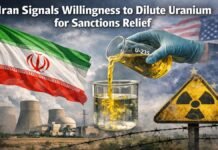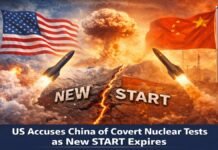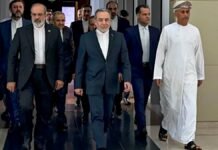
Key Points:
- Trump asserts his leadership stopped a “nuclear war” between India and Pakistan.
- Says a US airstrike destroyed Iran’s nuclear sites in a “precise and successful” mission.
- Praises tariffs as tools of diplomacy, claiming they prevented wars and raised billions in revenue.
- On Ukraine war: “We aren’t spending, NATO is.” Suggests US now profits from supplying missiles.
- Reveals nuclear disarmament talks with Putin, hints at broader deal but no clarity on Ukraine’s future security.
Wasington D.C.: At a White House press conference on Monday, US President Donald Trump sought to counter criticism, saying he is “not a dictator, but a very intelligent man.” His remarks came while addressing burning global security issues ranging from South Asia tensions to the Middle East and Ukraine.
“I Prevented India-Pakistan Nuclear War”
Trump stunned reporters by claiming he played the decisive role in stopping a nuclear showdown between India and Pakistan.
According to him, tensions had reached “the next level” with:
- Seven fighter jets already shot down during escalating hostilities.
- “Only a few hours left” before both nations prepared for nuclear strikes.
Trump asserted that his behind-the-scenes diplomacy with regional leaders averted a disastrous war. While he stopped short of explaining the specifics of his role, he suggested that Washington’s intervention saved millions of lives.
“Successful Strike on Iran’s Nuclear Bases”
Trump also confirmed for the first time that the US launched airstrikes on Iran’s nuclear facilities, calling it a “precise and successful operation.”
- The attack involved 52 military tankers, F-22 Raptors and B-2 stealth bombers.
- Trump claimed the strike destroyed critical nuclear infrastructure in Iran, preventing it from expanding weapons capability.
Iran has not officially acknowledged such strikes, but Trump used it to highlight his doctrine of “pre-emptive strength.”
Tariffs as a Weapon: “They Prevent Wars”
In addition to hard power, Trump emphasized his use of tariffs as a strategic tool, arguing that:
- “No one understood tariffs better than me.”
- Tariffs deterred adversaries while simultaneously raising billions in US revenue.
Trump insisted this policy not only hurt rival economies but also avoided potential wars, framing economic pressure as a substitute for direct military conflict.
US Policy Shift on Ukraine: “Focus is NATO, Not Kyiv”
Turning to the ongoing Russia-Ukraine war, Trump announced a significant shift:
- “We are not spending American money on Ukraine anymore.”
- The focus is now on supporting NATO directly, not Kyiv.
- Missiles and weapons supplied to NATO “eventually reach Ukraine,” but Washington now profits from defense deals rather than funding them outright.
He also suggested that it was “easier to stop the Russia-Ukraine war earlier,” but now conditions are more complex and fragile.
Talks with Putin on Nuclear Missiles
In his press conference, Trump also disclosed that he has discussed nuclear disarmament with Russian President Vladimir Putin, with the aim of cutting down arsenals.
- While he voiced optimism about an eventual agreement, he admitted no framework has yet been decided for Ukraine’s long-term security.
- He stressed his belief that a “solution will be found”, without elaborating on diplomatic timelines.
A Controversial Defense of Trump Doctrine
Trump’s sweeping claims from single-handedly defusing India-Pakistan tensions to justifying airstrikes in Iran and reshaping aid to Ukraine fit his trademark America First narrative.
Supporters view him as a strong and decisive leader who defuses crises through a mix of military boldness and economic tactics. Critics, however, argue that unverified claims and abrupt policy shifts create more uncertainty in an already volatile global environment.



















































